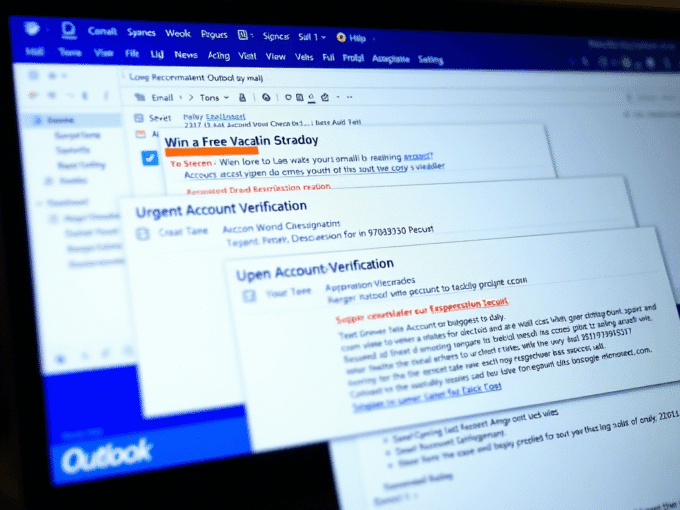In today’s dynamic job market, the pursuit of new career opportunities often begins online. While the digital landscape has revolutionized how we connect with employers, it has also become fertile ground for malicious actors. We’re seeing an alarming increase in the sophistication and frequency of fake job offers scam incidents, preying on the hopes and aspirations of job seekers worldwide.
The digital nature of applications, the urgency of finding employment, and the sheer volume of online interactions make job seekers particularly vulnerable. These scams aren’t just about lost money; they can lead to identity theft, emotional distress, and significant financial damage. Understanding these threats and cultivating a keen sense of awareness and vigilance is no longer optional – it’s essential for anyone navigating the job market today.
Table of Contents
What is a Fake Job Offers Scam?
A fake job offers scam is a deceptive scheme where criminals pose as legitimate employers or recruiters to trick job seekers into revealing personal information, transferring money, or performing other harmful actions. These aren’t genuine employment opportunities; they are elaborate traps designed to exploit vulnerability.
Scammers operate through various channels. You might receive an unsolicited email out of the blue, find a fraudulent listing on what appears to be a reputable job board, or even encounter them on professional networking sites. Their ultimate goal is usually to gain access to your financial accounts, steal your identity, or extort money directly.
Common Tactics Used by Scammers
To make their ruses believable, scammers employ a range of cunning tactics:
- Impersonating Real Companies and Recruiters: One of the most common methods for a fake job offers scam is to convincingly mimic well-known companies. They might use a company’s logo, branding, and even the names of real executives or HR personnel, creating fake websites or email addresses that look legitimate but have subtle typos or unusual domains (e.g.,
company@gmail.cominstead ofhr@company.com). - Posting Fake Listings on Job Sites and Social Media: Scammers often post attractive but entirely fictitious job openings on popular job boards, LinkedIn, Facebook, and other social media platforms. These listings often promise high salaries for minimal effort to lure in unsuspecting candidates.
- Unsolicited Job Invites and Immediate Offers Without Interviews: A major red flag for a fake job offers scam is receiving an immediate job offer without a proper interview process. Legitimate companies almost always conduct thorough interviews, often multiple rounds, before extending an offer. Scammers aim for speed, hoping to bypass scrutiny.
- Requests for Upfront Payments, Personal, or Financial Information: This is often the ultimate objective. Scammers will invent reasons to ask for money, such as “training fees,” “visa processing fees,” “background check fees,” or “equipment purchase.” They may also request highly sensitive personal details like bank account numbers, social security numbers (SSN), or national identification numbers (NIN) early in the process, ostensibly for “onboarding” or “payroll setup.”
Common Remote Work Job Scams
Many fake job offers scam operations specifically target the booming remote work market. These common remote work job scams often promise high pay for simple tasks like data entry, online shopping analysis, or even package forwarding. The allure of flexibility and good income without a commute makes these particularly attractive, but they frequently lead to requests for upfront payment for “software” or “training,” or involve the victim unknowingly participating in money laundering. Always be extra cautious with unsolicited remote work offers, especially those that seem too easy or bypass standard recruitment processes.
Warning Signs: How to Spot Fake Job Offers Scam
Vigilance is your strongest defense. Here are key warning signs that you might be dealing with a fake job offers scam:
- Vague Job Descriptions or “Too Good to Be True” Perks: Does the role description lack specific duties or qualifications? Are they offering an unbelievably high salary for a position that seems too easy or requires no experience? If it sounds too good to be true, it almost always is.
- Poor Grammar, Unprofessional Emails, Mismatched Domains: Legitimate companies, especially those hiring, maintain high professional standards. Emails filled with typos, grammatical errors, or sent from generic email addresses (like Gmail or Yahoo) or slightly misspelled company domains (e.g.,
companyy.cominstead ofcompany.com) are strong indicators of a scam. - Pressure to Act Fast or Share Personal Details: Scammers thrive on urgency. They’ll pressure you to accept an offer immediately, claiming other candidates are waiting or that the offer will expire. They also push for sensitive personal or financial information much earlier than any legitimate hiring process would require.
- Suspicious Interview Processes (Text-Only, Unfamiliar Apps): While some initial screenings might be via text, a complete interview process conducted solely through text messages, untraceable chat apps (like Telegram), or unfamiliar video conferencing tools (that require you to download special software) is highly suspicious.
- Requests for Payment, Purchase of Equipment, or Financial Transfers: This is the most critical red flag. No legitimate company will ask you to pay for job applications, interviews, training, equipment, background checks, or to transfer money for any reason. If they ask you to buy equipment from a specific vendor they recommend, especially with the promise of reimbursement, it’s a scam.
Online Recruitment Fraud Red Flags in Communications
Pay close attention to the way scammers communicate. Beyond grammar and domain issues, online recruitment fraud red flags include receiving messages at unusual hours, a complete lack of a phone conversation or video interview despite multiple stages, or an unwillingness to answer direct questions about the company or the role. Any communication that tries to rush you or prevent you from doing your due diligence should trigger immediate suspicion.
Real-Life Examples and Case Studies
The consequences of a fake job offers scam can be devastating. Consider these typical scenarios:
- The “Equipment Purchase” Scam: A job seeker receives an exciting offer for a remote data entry role. They are told to purchase expensive computer equipment from a specific, often fake, vendor, with promises of reimbursement. The victim pays, but the equipment never arrives, and the “company” vanishes.
- The “Phishing for Personal Data” Scam: A candidate is offered an impressive salary for an administrative assistant position. During “onboarding,” they are asked to fill out extensive forms with their bank account details, Social Security number, and even copies of identification for “payroll purposes.” This information is then used for identity theft.
- The “Money Mule” Scam: In a more sinister variant, victims are hired for what seems like a legitimate remote financial processing role. They are instructed to receive money into their personal bank account and then transfer it to other accounts, keeping a small percentage. Unbeknownst to them, they are acting as “money mules” for illicit funds, becoming complicit in money laundering.
These cases highlight how sophisticated these scams have become, leveraging trust and vulnerability for criminal gain.
How to Verify and Protect Yourself
Protecting yourself from a fake job offers scam requires proactive steps and a healthy dose of skepticism:
- Research the Company via Official Channels and Websites: Don’t rely on links provided in suspicious emails. Instead, independently search for the company’s official website. Go to their “Careers” or “About Us” section to see if the job is actually listed there.
- Check for Legitimate Contact Information and Business Credentials: Look for official phone numbers and physical addresses. Call the company directly using a number from their official website (not one provided in the suspicious email) to verify the recruiter and the job offer. Check business registries if possible.
- Use Trusted Job Platforms: While scammers can infiltrate legitimate sites, using well-known and reputable job boards (like LinkedIn, Indeed, Glassdoor) that have their own reporting mechanisms can add a layer of safety.
- Never Pay Fees or Share Sensitive Data Early in the Process: This is the golden rule. No legitimate employer will ask you to pay for job applications, interviews, training, equipment, background checks, or to transfer money for any reason.
- Trust Your Instincts and Stay Skeptical of High-Pressure Tactics: If something feels off, it probably is. Don’t let the excitement of a potential job cloud your judgment. A legitimate hiring process will respect your need to review documents and ask questions.
Verifying Job Offer Authenticity Online
To specifically verify job offer authenticity, cross-reference information meticulously. Check if the hiring manager’s name matches their LinkedIn profile and the company’s official website. Look for reviews of the company (and the recruiter, if named) on sites like Glassdoor or Google. If the offer came through an email, scrutinize the sender’s full email address, not just the display name. These diligent steps can quickly reveal inconsistencies typical of a fake job offers scam.
Steps to Take If You Suspect a Fake Job Offers Scam
If you encounter what you believe to be a fake job offers scam, taking immediate action is crucial:
How to Report:
- To the Company Impersonated: Contact the HR or legal department of the legitimate company directly (using contact info from their official website) to inform them their name is being used fraudulently.
- To the Job Platform: If the scam originated from a job board or social media platform, report the listing and the user profile to their support team immediately.
- To Government Fraud Authorities: In India, you can report it to the National Cybercrime Reporting Portal. In the US, contact the FBI’s Internet Crime Complaint Center (IC3) or the Federal Trade Commission (FTC). Similar agencies exist in other countries.
Action Steps:
- Cease Communication: Immediately stop all contact with the suspected scammer. Do not respond to any further emails, calls, or messages.
- Do Not Send Money: If you haven’t already, absolutely do not send any money or provide any financial details.
- Preserve Evidence: Keep copies of all communications (emails, chat logs, screenshots of job postings) as these can be valuable for law enforcement.
Reporting Recruitment Scammers Effectively
Knowing how to report recruitment scammers effectively is vital. Provide as much detail as possible to the authorities, including full email headers, screenshots of the job posting, messages, and any transaction details if money was involved. The more information you provide, the better equipped law enforcement and platform administrators will be to investigate and prevent further scams. Don’t feel embarrassed; you are helping to protect others from falling victim to the same fake job offers scam.
Stay Informed, Stay Safe
The digital job market offers incredible opportunities, but it also demands vigilance. The rise of fake job offers scam tactics underscores the critical need for every job seeker to be informed and cautious. These scams thrive on desperation and a lack of awareness, but with the right knowledge, you can protect yourself.
Remember the key takeaways: verify everything, never pay for a job, and always trust your instincts. By staying informed and sharing this knowledge with your network, we can collectively raise awareness and make it harder for these fraudsters to succeed. As a final reminder: If it sounds too good to be true, it probably is. Your future career is worth protecting.















Leave a comment